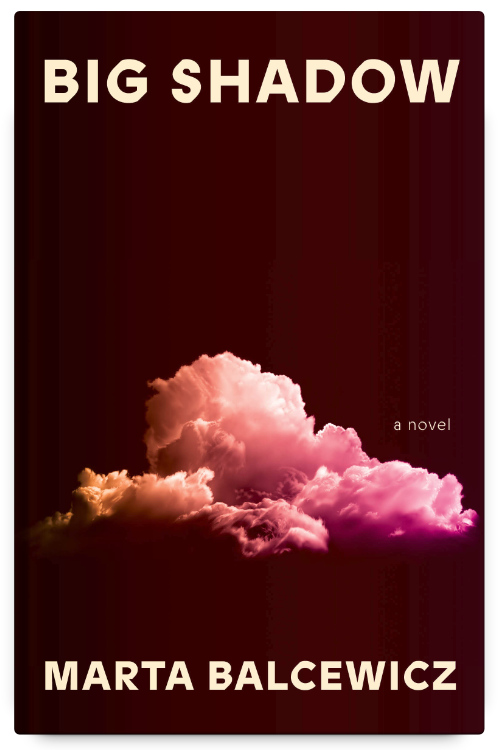Spring 2023 Fiction Preview: Big Shadow by Marta Balcewicz

Today’s Spring 2023 Fiction Preview features Marta Balcewicz’s debut novel, Big Shadow!
Set in an unnamed town in the summer of 1998, Big Shadow follows Judy, an isolated and inexperienced teenager on the cusp of adulthood struggling to craft an identity for herself—especially as the artist she wants to be. Her only friends are increasingly obsessed with a cultish belief in a coming “Big Shadow.” Her mother is afraid of life and finds solace in TV shows. At her lowest point, Judy meets Maurice Blunt, a visiting summer poetry class professor who is a “has-been” fixture of the 1970s NYC punk music scene. Judy believes Maurice—a man more than twice her age desperately seeking lost adoration—is the ticket out of her current life.
“Preternatural, radiating warmth and coldness and colour and light, Big Shadow brims with intelligence and wit. While one world flickers in the background, our narrator enters another, but by the end, we see that the flickering is, amazingly, reality too. I never quite knew where this novel was taking me, which is exactly where I wanted to be going,” writes Amina Cain, author of Indelicacy.
We’re delighted to share an introductory video and reading from Marta Balcewicz. Enjoy!
In addition, we’ve selected an excerpt from the opening chapter, which you can read and enjoy below. Big Shadow will be released on May 16, 2023, and is available now for pre-order now from our online shop or from your local independent bookstore.

1.
For a while I had a job where I’d watch the passing clouds. In a notebook that I always carried with me, I’d write, “That one went on its way,” “There was nothing unusual in that one.” I learned how the clouds set themselves apart, by becoming shapes that had nothing to do with one another: wedding veils, curdled milk, trails of horse droppings, perfectly spaced out. I learned their proper names: cirro, stratus, nimbo. The clouds in the opening credits of The Simpsons are stratocumulus, for example. Nephology is the study of clouds and Nephrology is the study of kidneys. I could tell you so much more; I was hyper-aware and educated. I walked about always tense, and looked upwards a lot so that at the end of the day I’d feel an ache in my neck and shoulders.
Calling the cloud job a “job” is inaccurate. There was no hiring; I was really just spending time with the only two people I knew. I saw little of them and for the most part sat stationed outdoors. My cousin Christopher and his friend Alex felt I was uniquely qualified to be the one who observed, and outside, on a lawn, the perspective of a sky is clearer. Once the weather warmed up, I didn’t think to mind. I also hadn’t thought to mind during the earlier spring days when this all started. Only then, I’d bring out a blanket. The job and the cloud watching it involved had been invented entirely by Alex. And it was par for the course that if he had an idea, Christopher and I usually went along with it. Or at least we considered his idea very seriously, so much so that it felt like a job to finally execute it. There isn’t much to do when there’s nothing but lawn and more lawn around. There’s not much to do when you’re young and stuck together like we were.
For a time I became one with my job in the way anybody with a serious calling would, and I thought myself essential. A surgeon or a president must look at their hands a hundred-plus times every day. In their palms and their hardened fingers dwell their accomplishments, like a list displayed by a computer. I had the same compulsion. I thought my notebook notations weren’t far from saving a life. I’d sit on the sun lounger with a novel in my lap and the cloud notebook underneath it. In a cup set on the grass at my side, I kept a slim fountain pen that I especially liked to use. Even at the height of it — when I felt no outward disdain — the task of monitoring the sky was idle-work, in the most painful, extreme sense of stopped, sleepy, and dead. I suppose I took it too literally at points, though sometimes not literally enough.
“Do you sense something coming,” Alex would say. “That’s all it’s about, a sense.” I sensed a lot of things on any given day, and the frustrating thing about sense is that it’s always highly impressionable. In answering him, I pretty much always said, “I sensed nothing relevant today and sensed nothing the day before either.” Having the cloud notebook, I could at least hold it up and point to the notations. “Nothing,” “nothing,” said my notes. Though sometimes I would elaborate: “An extra-large nimbus moved so slowly, I thought it was stopped. I was sure it was the Big Shadow. The trees were whipping, it was obviously windy, so why no movement? But then I saw that the cloud was shrinking, which is movement. It was shrinking very fast actually. Imagine standing on a set of tracks watching a train leave the station, eventually it’s a toy, soon after it’s a dot, soon after that, nothing.
Marta Balcewicz spent her early childhood in Pomerania and Madrid, and now lives in Toronto. Her work has appeared in Catapult, Tin House online, Vol. 1. Brooklyn, Washington Square Review, The Rumpus, and Passages North amongst other publications. Her fiction was anthologized in Tiny Crimes (Catapult, 2018). She received a fellowship from Tin House Workshops in 2022. Big Shadow is her first novel.

